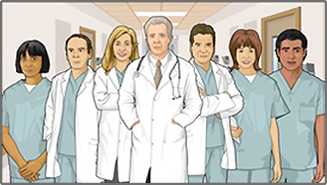Psychosis
Psychosis occurs when a person loses contact with reality. The person may:
- Have false beliefs about what is taking place, or who one is (delusions)
- See or hear things that are not there (hallucinations)
Causes
Medical problems that can cause psychosis include:
- Alcohol and certain illegal drugs, both during use and during withdrawal
Alcohol
Alcohol use disorder is when your drinking causes serious problems in your life, yet you keep drinking. You may also need more and more alcohol to f...
Read Article Now Book Mark ArticleIllegal drugs
Substance use disorder occurs when a person's use of alcohol or another substance (prescribed medicine or illegal drug) leads to health issues or pro...
Read Article Now Book Mark Article - Brain diseases, such as Parkinson disease and Huntington disease
- Brain tumors or cysts
- Dementia (including Alzheimer disease)
- HIV and other infections that affect the brain
- Some prescription medicines, such as steroids and stimulants
- Some types of epilepsy
- Stroke
Stroke
A stroke occurs when blood flow to a part of the brain stops. A stroke is sometimes called a "brain attack. " If blood flow is cut off for longer th...
Read Article Now Book Mark Article
Psychosis may also be found in:
- Most people with schizophrenia
Schizophrenia
Schizophrenia is a mental disorder that makes it hard to tell the difference between what is real and not real. It also makes it hard to think clearl...
Read Article Now Book Mark Article - Some people with bipolar disorder (manic-depressive) or severe depression
Bipolar disorder
Bipolar disorder is a mental condition in which a person has wide or extreme swings in their mood. Periods of feeling sad and depressed may alternat...
Read Article Now Book Mark ArticleDepression
Depression may be described as feeling sad, blue, unhappy, miserable, or down in the dumps. Most of us feel this way at one time or another for shor...
Read Article Now Book Mark Article - Some personality disorders
Symptoms
A person with psychosis may have any of the following:
- Disorganized thought and speech
- False beliefs that are not based on reality (delusions), especially unfounded fear or suspicion
- Hearing, seeing, or feeling things that are not there (hallucinations)
- Thoughts that jump between unrelated topics (disordered thinking)
Exams and Tests
Psychiatric evaluation and testing are used to diagnose the cause of the psychosis.
Laboratory testing and brain scans may not be needed, but sometimes can help pinpoint the diagnosis. Tests may include:
- Blood tests for abnormal electrolyte and hormone levels
- Blood tests for syphilis and other infections
Blood tests for syphilis
The VDRL test is a screening test for syphilis. It measures substances (proteins), called antibodies, which your body may produce if you have been i...
Read Article Now Book Mark Article - Drug screens
- MRI of the brain
MRI of the brain
A head MRI (magnetic resonance imaging) is an imaging test that uses powerful magnets and radio waves to create pictures of the brain and surrounding...
Read Article Now Book Mark Article
Treatment
Treatment depends on the cause of the psychosis. Care in a hospital is often needed to ensure the person's safety.
Antipsychotic medicines, which reduce hallucinations and delusions and improve thinking and behavior, are helpful.
Outlook (Prognosis)
How well a person does depends on the cause of the psychosis. If the cause can be corrected, the outlook is often good. In this case, treatment with antipsychotic medicine may be brief.
Some chronic conditions, such as schizophrenia, may need lifelong treatment with antipsychotic medicines to control symptoms.
Possible Complications
Psychosis can prevent people from functioning normally and caring for themselves. Left untreated, people can sometimes harm themselves or others.
When to Contact a Medical Professional
Contact your health care provider or mental health professional if you or a member of your family is losing contact with reality. If there is any concern about safety, take the person to the emergency room to be seen by a provider.
Prevention
Prevention depends on the cause. For example, avoiding alcohol prevents psychosis caused by alcohol use.
Reviewed By
Fred K. Berger, MD, addiction and forensic psychiatrist, Scripps Memorial Hospital, La Jolla, CA. Also reviewed by David C. Dugdale, MD, Medical Director, Brenda Conaway, Editorial Director, and the A.D.A.M. Editorial team.
American Psychiatric Association. Schizophrenia spectrum and other psychotic disorders. Diagnostic and Statistical Manual of Mental Disorders. 5th ed. Text Revision (DSM-5-TR), Washington, DC: American Psychiatric Association Publishing; 2022.
Lim C, Paudel S, Holt DJ, Freudenreich O. Psychosis and schizophrenia. In: Stern TA, Wilens TE, Fava M, eds. Massachusetts General Hospital Comprehensive Clinical Psychiatry. 3rd ed. Philadelphia, PA: Elsevier; 2025:chap 27.
Lyness JM, Lee HB. Psychiatric disorders in medical practice. In: Goldman L, Cooney KA, eds. Goldman-Cecil Medicine. 27th ed. Philadelphia, PA: Elsevier; 2024:chap 362.
Disclaimer
© 1997- A.D.A.M., a business unit of Ebix, Inc. Any duplication or distribution of the information contained herein is strictly prohibited.



